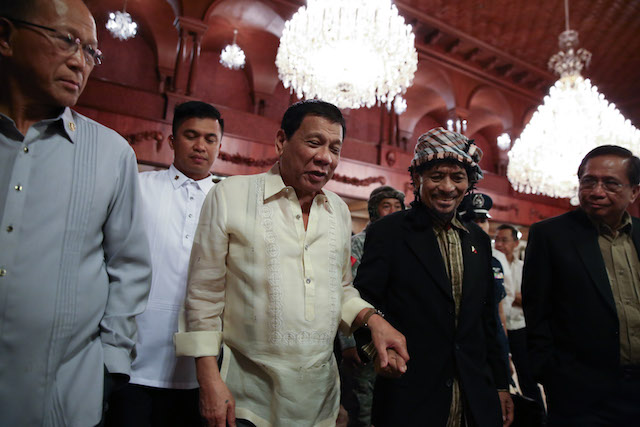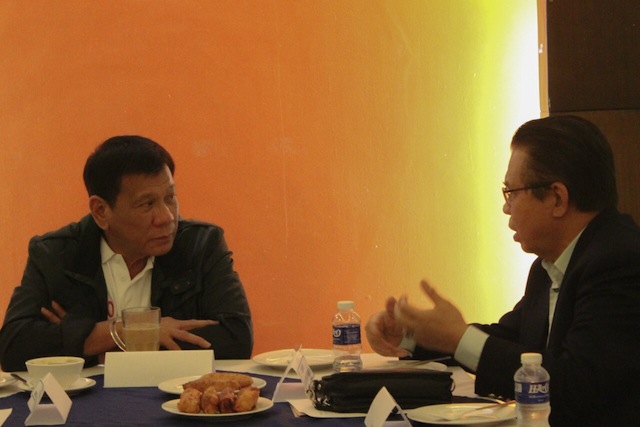DAVAO CITY (MindaNews / 04 November) – President Rodrigo Duterte will sign the Executive Order creating the expanded Bangsamoro Transition Commission (BTC) at 3 p.m. Monday in Malacanang but it is not clear if the Moro National Liberation Front (MNLF) faction under founding chair Nur Misuari will be part of it, Irene Santiago, chair of the government’s Peace Implementing Panel told a press conference here Friday.
“I don’t know. I am not at liberty to give the names of the BTC members,” Santiago told a press conference at the Philippine Information Agency here Friday.
 President Rodrigo Duterte tours Moro National Liberation Front (MNLF) founding chair Nur Misuari inside Malacañan Palace on November 3. KING RODRIGUEZ/ Presidential Photo
President Rodrigo Duterte tours Moro National Liberation Front (MNLF) founding chair Nur Misuari inside Malacañan Palace on November 3. KING RODRIGUEZ/ Presidential Photo
The Duterte administration has increased the membership of the BTC from 15 to 21 to make the body that will draft the Bangsamoro law be “more inclusive.”
Santiago said the names of the 10 government nominees who will be appointed by President Rodrigo Duterte will be revealed after the EO is signed. The MILF is nominating 11 to the MILF-led BTC.
Earlier, Patmei Ruivivar, head of the Communications team of the Office of the Presidential Adviser on the Peace Process said the EO would be signed on November 3 in Davao City.
No signing happened that day. Instead, Duterte received Misuari in Malacanang, on the first day of Misuari as a free man. A fugitive since September 2013, Misuari gained temporary liberty after a court in Pasig ordered the suspension of the proceedings of the cases and the enforcement of warrants of arrest against him to allow him to “attend peace talk sessions with the government.”
At the Davao Peace Fair on September 21, Santiago said Misuari was reluctant to join the BTC because it is an “MILF structure.”
But the MNLF faction under Muslimin Sema will be given three seats, she said.
As an independent body, the BTC will be tasked to consolidate all peace agreements and legislation into one enabling law on the Bangsamoro, call for an inclusive Bangsamoro Consultative Assembly to discuss the new draft of the enabling law, and submit to Congress the new version of the enabling law not later than July 2017.
 Then President-elect Rodrigo Duterte and Moro Islamic Liberation Front (MILF) chair Al Haj Murad Ebrahim spent around 20 minutes to talk peace during a one-on-one meeting late evening on June 17 at Hotel Elena in Davao City. Photo contributed to MindaNews
Then President-elect Rodrigo Duterte and Moro Islamic Liberation Front (MILF) chair Al Haj Murad Ebrahim spent around 20 minutes to talk peace during a one-on-one meeting late evening on June 17 at Hotel Elena in Davao City. Photo contributed to MindaNews
In a statement, the Office of the Presidential Adviser on the Peace Process said the Bangsamoro peace process is “on track with both the MILF and the MNLF on board for a more inclusive resolution to the conflict.”
“They are now willing to sit at the peace table and work together with the government to address the historical injustices committed against the Moro people. This is an unprecedented and historical development,” it said.
Santiago vowed to keep the conversations going to attain “justice, healing and reconciliation” and to ensure that all sectors are included in the peace-building.
“What we do is to make sure that no people are excluded. If you look at the root of the problem in Mindanao… people feel excluded,” she said.
Reacting to Fr. Eliseo Mercado Jr.’s proposal of a Transitional Law Drafting Commission representing the MNLF, MILF, Indigenous Peoples, Traditional Leaders, Settlers, and Government, with three rotating chairs, Santiago assured that the crafting of the enabling law and steps in the peace process will be based on the 2014 Comprehensive Agreement on the Bangsamoro (CAB).
Mercado proposed that instead of BTC, an “appropriate body” be set up with equal and proportional representation among the six sectors he mentioned, to “craft a Transitional Law that would implant all peace agreements including the IPRA (Indigenous Peoples Rights Act).”
Santiago said, “what you do is to make sure that there is a venue for everyone to pariticipate. Mas konti pa nga eh. Ten lang, paano mag-representative yan? Kaya sabi ko ‘let’s open it up.’ But let’s go back to what the interest is. The interest is, to be heard and to be taken seriously.”
She said she will also be holding “peace tables” similar to consultations, to get insights from the affected communities.
“Those peace tables will do that. BTC will craft the law based on the CAB, and we will make sure that the public will participate in the way it can participate in making peace. We cannot get out of the CAB, kung anong ni-negotiate sa CAB yun yung enabling law, kung anong kulang pa sa 1996 FPA, yung ang ilalagay sa enabling law,” she said.
‘Convergence’
Santiago said there maybe a convergence of the peace processes with the National Democratic Front, MILF and the different factions of the MNLF but added, “not yet, not now. I can foresee, maybe, someday we will get to that because you know we are thinking in terms of the entire country here.”
She said Duterte carries the voice of the people for peace.
“And while it is divided into the CPP-NPA-NDF process and MILF and MNLF process for now, I think President Duterte is so capable because he thinks that way. He is so capable of uniting his country,” she said.
Getting Misuari out of Sulu is a “bold step already among the bolds steps” that the Duterte has so far taken, she said.
She described the opportunities for peace under the Duterte administration as “seismic, earth-shaking.”
“We will not exclude anyone but we will include. It is difficult (but) now we have to start thinking of shared future. Kailangan nating ng peace tables because an enabling law provides the framework, respect ourselves as a society,” she said.
The OPAPP statement added that only Duterte can solve the long-standing problem of peace and order in Mindanao..
“The trust in the present leadership from the MNLF founder is a key ingredient in the President’s roadmap that will lead us to peace in Mindanao,” it said. (Antonio L. Colina IV)
